Chronicle of 1st D-TRANSFORM Leadership School – Day 2 (Nov. 15th, 2016)
by Jean-François Colas, UOC Doctoral School
The second day of the 1st D-TRANSFORM Leadership School focused on on-campus solutions: digital library, academic resistance and learning analytics.
The newcomers having been introduced, the first Working Session of the day ‘Digital libraries and digitally enabled study spaces: more than just a librarian’s issue?’ was launched. Rosie Jones (OU) presented the case of the Open University Library where s
he leads a team of 74 colleagues, a relatively small number, she said, for the biggest UK University. A first main challenge they face has to do with the ‘Digital capabilities’ that students and staff would need for the University to be fully digital. A second challenge comes with the design of ‘New Learning Environments’: it should aim at making the library a community space. The UOC library, born digital, was presented by its director Ciro Llueca who talked about the importance of learning resources, research and students services in an e-learning university. Both Jones and Llueca agreed that libraries need to teach students digital capabilities to deal with plagiarism. More generally, digital libraries have a huge role to play in developing critical thinking in students. The session closed with a Hands-on activity where attendees performed in groups a SWOT analysis of their institutions’ libraries as digital learning spaces.
In the second Working Session ‘Overcoming academic resistance to ICT-based teaching’ András Benedek (Budapest University of Technology and Economics) stressed that one has to be careful when trying to change the old, living structure of a university. Management especially needs to know about pedagogy, new learning theories and the application of e-learning in practice. Overall, decisions about ICT-based teaching are often taken in a non-hierarchical manner from many personal initiatives that merge into a shared system. Similarly, Roumiana Peytcheva-Forsyth (Sofia University) described a de-centralised model of transition from traditional-to-digital university that was observed in the biggest Bulgarian universities, wherea
s smaller universities can manage a centralised model where staff is provided support, as well as short courses on ICT integration, e-learning design and implementation. Attendees were invited to share their thoughts on ICT barriers and to propose strategies for action. It was suggested, for instance, that policies are needed for recognising ICT in education, not just on research. Producing good quality e-learning experiences represents a particularly time-consuming teamwork effort that should be better compensated.
The afternoon was dedicated to Learning Analytics (LA), with a keynote on its Promise and Reality by Anne Boyer (UL), followed by a Working Session with 4 speakers on whether LA is ready now to serve institutional needs.
For Anne Boyer, a successful LA implementation is a cultural challenge, not a technological one. LA is not only a set of tools, it is a part of an institutional strategy that supports the vision of the University on open education. She suggested that LA should be embedded in an institutional strategy as it offers highly promising results for students retention, learning personalisation, quality improvement of education and rationalization of cost. But adopting LA requires significant investment of time, resources and money. She provided 3 main pieces of advice (1) have a high level of information about your data and a strong monitoring of the data flow (2)
form the right project team by mixing actors, technicians and experts and (3) often try to compare ‘a priori’ hypotheses with reality. Anne concluded that ‘the combination of embedded administrative and academic technologies, big data, powerful analytical tools, and sophisticated data-mining techniques are poised to spark a revolution in how education is delivered and how the efficacy of that education is measured’. In the Working Session Jordi Conesa (UOC) talked about the way to maximize the success of Analytical Information Systems in Universities and introduced the concept of ‘Academic Analytics’ that emphasizes analytics at institutional, regional, and international levels. Julià Minguillón (UOC) presented results on LA at UOC for fighting dropout, a mainstream scenario throughout the afternoon session. Azim Roussanaly (UL) linked LA with adaptive learning in the case of digital thematic universities in France. Finally, based on The Open Polytechnic case study in New Zealand, Mark Nichols (OU) made a simple recommendation for making analytics work: have a not-too-complicated, specific objective that systematises the use of already available data and support functions.
‹ Chronicle of 1st D-TRANSFORM Leadership School – Day 1 (Nov. 14th, 2016) Day 3 – Chronicle of 1st D-TRANSFORM Leadership School (Nov. 16th, 2016) ›

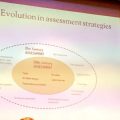
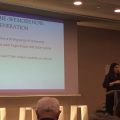



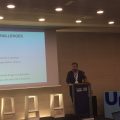
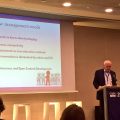
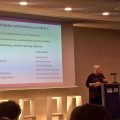
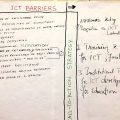
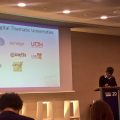
Comments are currently closed.